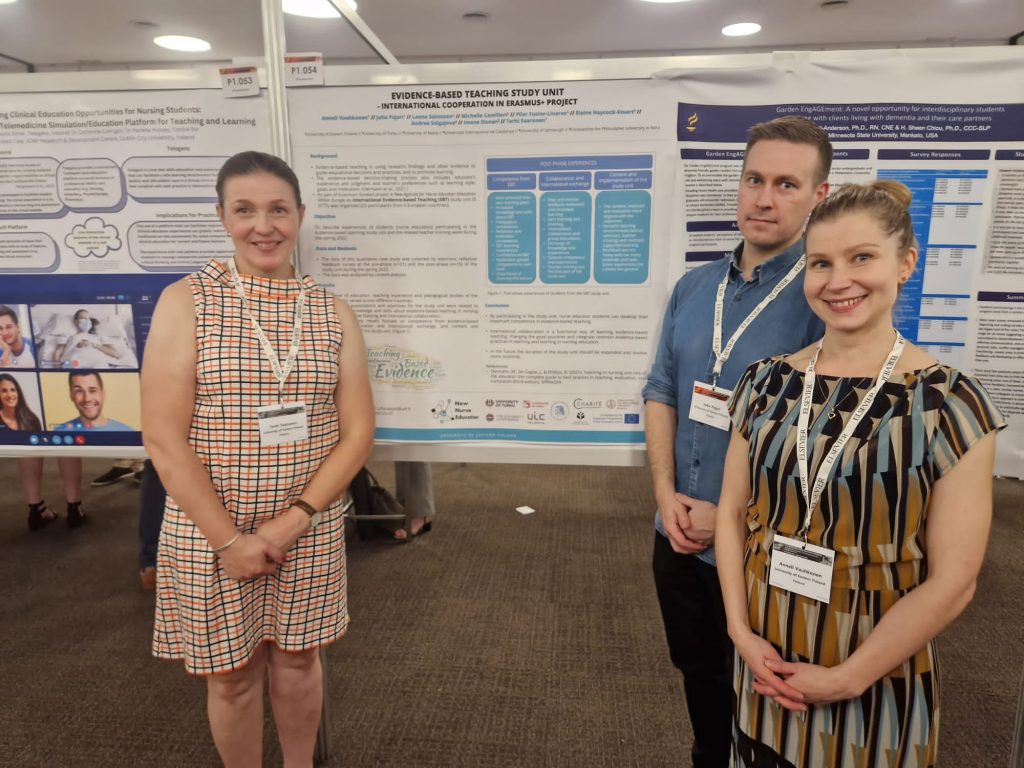As the holiday is approaching its good to discuss a little bit about occupational well-being. Occupational well-being in education (we are in this project as nurse educators) can be considered to consist of working conditions, work community, worker’s recourses and work, and professional competence. Working conditions includes physical, biological and chemical factors ja occupational safety. Work community refers to management, the working atmosphere, collegiality, and appreciation. Worker’s resources and work means the health, physical and mental fitness, the workload and occupational health care services. Professional competence refers to education, continues professional development and different areas of competence. (Saaranen et al. 2020.)
And how these aspects are visible in educators work and in this case project workers? For example, ergonomic furniture and equipment have a great impact on our health and well-being during and after a working day. Biological factors, such as social isolation during COVID-19 pandemic have had its own influence on our well-being in many ways. Because of COVID-19, we were unable to organize the first Kick-of meeting, and the first face-to-face meeting moved on for a year. Nevertheless, our project started well, and the meeting was replaced by virtual meetings.
An appreciative and supportive atmosphere and collaborative management improves employee satisfaction in their work (Arian et al., 2018). Based on research we can say that educators in health care are feeling that they are respected, and they get help and support from their colleagues (Saaranen et al., 2021). One of the best contributions of this project has been an inclusive and conversational atmosphere. In addition to the numerous virtual meetings, we have been able to meet face to face and openly discuss matters that are important to us. The feeling of cohesion has been tangible and confirmed we want to continue work together after this project. The power of co-operation brings a great sense of well-being. In addition, the project includes employees from many different career stages, and this can be seen as a great richness. We have all heard that competence brings confidence, but the competence of a more experienced colleague also gives confidence to the less experienced.

On the other hand, the work of educator is very independent (Arian et al., 2018) and that is partially why we like this work. Working hours are flexible and we can influence our working schedule. However, this involves the reverse side of the coin. When we are experiencing the great engagement to work, we may forget to take breaks in our work. The educator’s work is often more mentally than physically demanding (Saaranen et al., 2020), and often the amount of work is felt too heavy (Rinne et al., 2022). The peaceful Christmas holiday in approaching, but often the time before the holidays can feel nerve-wracking. As we know the work of educator is pretty hectic before holidays (Saaranen et al., 2020) and this is true also in the project work. The deadlines are coming closer, and we have hurrying to do all the work we have promised to do. We almost wish that there should be more hours in one day or an extra day in a week. However, we should not belittle our need to recover from the strain of work. Recovery from work means the process when we reduce or eliminate the psychical or mental strain caused by work (Sonnentag, 2015). There must be sufficient recovery between working days; although one of them likes more regular working hours every day and the other one likes a more intensive work week with a longer return. The main thing is that there is enough recovery from the work. We know that exercise, a meaningful hobby, good nutrition, and adequate sleep promotes our recovery from work and thus our well-being.

During busy days, it is good to consciously stop and think about the recovery from work during the working day. Recovery from work should start already during the working day and breaks are one of the most important ways to promote the recovery during the working day. By detaching ourselves from our work during the break and feeling that the break is meaningful is important for recovery and well-being (Virtanen et al., 2021). This can be for example something that we like to do, short walk outside, breathing or relaxing exercise (Rinne et al., 2020), or discussion (something else than work-related) with your colleague during your lunch break.
So we send a message to ourselves and to others: Take some time for yourself today, tomorrow and the coming weeks and do something relaxing in the middle of the day and between working days. By doing so, we can start our Christmas holiday with a better well-being and more relaxed. What could be your promise to yourself for the following year related to your well-being?
Anneli, Juha and Terhi
University of Eastern Finland, Department of Nursing Science
References:
Arian, M., Soleimani, M., & Oghazian, M. (2018). Job satisfaction and the factors affecting satisfaction in nurse educators: A systematic review. Journal of Professional Nursing, 34(5), 389–399. https://doi.org/10.1016/j.profnurs.2018.07.004
Rinne, J., Koskinen, S., Leino-Kilpi, H., Saaranen, T., & Salminen, L. (2021). Self-conductive interventions by educators aiming to promote individual occupational well-being—A systematic review. International Journal of Educational Research, 107, 101755–. https://doi.org/10.1016/j.ijer.2021.101755
Saaranen, T., Kankkunen, P., & Juntunen, A. (2020). Terveysalan opettajien työhyvinvointi ja sen edistäminen – työntekijän ja hänen työnsä näkökulma. (The status and promotion of the occupational well-being of health care teachers – the perspective of workers and their work.) Journal of Nursing Science, 32(3), 154–165. (Abstract in English)
Saaranen, T., Kankkunen, P., & Mönkkönen, A. (2021). Occupational wellbeing through community factors – questionnaire survey to health educators. (Työyhteisötekijöillä työhyvinvointia – kyselytutkimus terveysalan opettajille.) Tutkiva Hoitotyö, 19(3), 32–39. (Abstract in English)
Sonnentag, S., & Fritz, C. (2015). Recovery from job stress: the stressor‐detachment model as an integrative framework. Journal of Organizational Behavior, 36(1), 72–103. https://doi.org/10.1002/job.1924
Virtanen, A., Van Laethem, M., de Bloom, J., & Kinnunen, U. (2021). Drammatic breaks: Break recovery experiences as mediators between job demands and affect in the afternoon and evening. Stress and health : journal of the International Society for the Investigation of Stress, 37(4), 801–818. https://doi.org/10.1002/smi.3041
